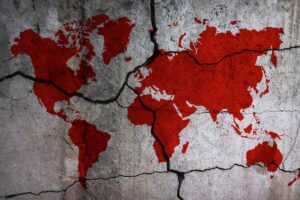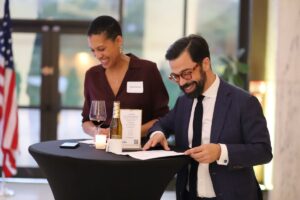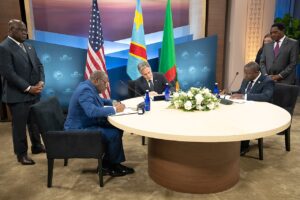(Beijing, China / Washington, United States) – Embarking on a journey of diplomatic exploration and constructive dialogue, the Stimson Center facilitated a series of fall engagements aimed at decoding the complex relationship between the United States of America and the People’s Republic of China. Among these collaborative efforts in late September were meetings held at the Institute of World Economics and Politics (IWEP) at the Chinese Academy of Social Sciences as well as gatherings of high-level military representatives at the China Institute For International Strategic Studies (CIISS).
In an environment conducive to open dialogue, conversations navigated the difficult terrains of military and strategic perceptions, the economic relationship between the United States and China, and Russia’s war in Ukraine. Chinese participants shared nuanced insights into their country’s current economic landscape and expressed optimism that despite global uncertainties and numerous challenges, particularly in the service, financial, and housing sectors, the resilience of the manufacturing and agricultural sectors remains strong.
The meetings also examined global economic shifts, exploring the dynamics of the US dollar as a global currency and analyzing broader economic conditions in the United States, Europe, and Russia. Participants issued shared concerns regarding the potential escalation of Russia’s war in Ukraine and recognized a common interest in preventing further geopolitical instability, particularly concerning the use of tactical nuclear weapons. The discussions also touched on the realms of innovation and competition, evaluating the effectiveness of sanctions not only through an economic lens, but also considering the broader political implications on US-China relations.
In the meeting hosted at IWEP, dialogue participants advocated for increasing the number of dialogue formats – many of which were closed during the pandemic – as a strategy to increase transparency and reduce scapegoating between the U.S. and China
At the dialogue hosted at CIISS, participants expressed concerns about the growing institutionalization of anti-China sentiments within the U.S. government and vice versa, evident in the military strategies of both nations, each perceiving the other as a major challenge in the 21st century. Dialogues also unfolded around the “One China“ policy espoused by many Western countries with Chinese representatives expressing concerns regarding perceived shifts in the US stance. For some, the reemergence of the Taiwan question has been met with increasing apprehension, necessitating a mindful and consistent approach to maintain stability and clarity in policies and actions concerning China and Taiwan.
A notable observation made by European participants was the perception of intensified US protectionism under the Biden administration, even compared to its predecessor. Furthermore, the meeting shined light on the complex geopolitical landscape involving the Russia-Ukraine conflict, with Chinese representatives expressing a deep concern regarding potential escalations. Appreciation was conveyed for the US’s measured approach, recognizing a mutual interest in fostering stability and exploring political solutions to the ongoing conflict.
Stimson would like to thank Lanxin Xiang, a distinguished fellow with our Strategic Foresight Hub, who helped assemble the dialogues in Beijing and brought together distinguished Chinese participants, including the former Director of the Chinese Naval Armament Department; the former Head of the International Economic Bureau of the Central Committee Financial Commission; the former Director of the Cyber-command Department at the People’s Liberation Army (PLA); the former Defense Attaches to the United States, Russia, and Ethiopia; and the former Deputy Director of the Politburo’s Foreign Affairs Office.
Through the creation of meetings like these, the Stimson Center is reiterating its dedication to create spaces for open, respectful, and insightful dialogues – even among divergent perspectives. In a world of disarray, meeting formats hosted by the Stimson Center aim to unravel complexities, nurture mutual understanding wherever possible, and pave pathways towards a more stable and cooperative future in US-China relations.



